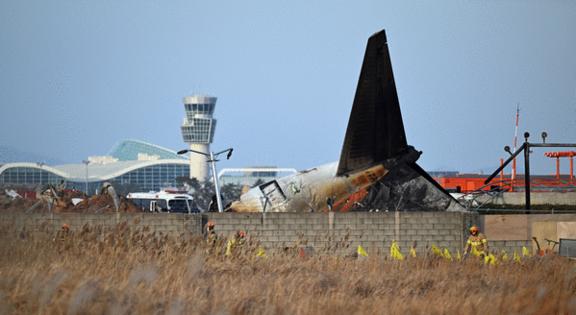South Korean police search aviation agency over plane crash
Published in News & Features
South Korean police searched offices and the airport where Sunday’s deadly plane crash occurred, as part of a series of raids on Thursday aimed at determining who is responsible for the disaster.
Investigators from the Jeonnam Provincial Police Agency searched the office of the Busan Regional Aviation Administration in Muan county as well as the Muan International airport and Jeju Air Co.’s office in Seoul starting from 9 a.m., a spokesperson at the police office said by phone. The coordinated raids came after police launched their own probe into the fatal crash of the Boeing 737-800 plane operated by Jeju Air.
The plane was attempting an emergency landing on Sunday when it skidded on its belly off the runway and exploded after hitting a structure, killing 179 of the 181 people on board. The accident came a few minutes after the airport control tower had warned the pilot of the risk of bird strikes. The police investigation aims to uncover the cause of the country’s deadliest aviation disaster and apportion responsibility, the spokesperson said. The searches were reported earlier by Yonhap News.
Experts have raised questions over the design of the airport, especially the concrete-topped embankment at the end of the runway. The structure was built to support the airport’s localizer antennas, used to guide planes when landing. Transport officials have said the equipment was built in accordance with local rules.
Concerns are also surfacing about the financial situation of Jeju Air, something officials from the carrier played down on Thursday.
Jeju Air dismissed concerns over a liquidity risk because of the accident and while the company is facing more cancellations than before, it’s still getting some new bookings, a spokesman said.
The airline had about 260 billion won ($177 million) of prepaid flight tickets as of the end of September, a November filing showed, some of which may now have to be returned to customers. Jeju Air plans to reduce its winter flight schedule by 10%-15% and cuts may start next week, the spokesman said.
Separate from the police investigation, Korea’s transport ministry is leading the civil-aviation probe into the crash in collaboration with officials from the U.S. National Transportation Safety Board and Boeing Co. Those efforts are focusing on analysing the cockpit voice recorder and the flight data recorder, two key pieces of evidence retrieved from the wreckage.
Investigators have fully extracted data from the voice recorder, Joo Jong-wan, a senior official at the transport ministry, said at a briefing Thursday. The device contains recordings of the pilot’s communication and engine noises during the final two hours, authorities said.
The flight data recorder, which monitors parameters such as altitude, airspeed and heading, will be sent to the U.S. for repair as it was damaged during the crash.
Korean investigators have so far been unable to locate the engine amid the wreckage, which is likely to be another critical piece of evidence, Joo said.
One of the questions the transport ministry’s investigation is currently looking into is why the plane’s landing gear appears not to have been deployed before the control tower issued its bird-strike warning. They are also checking the maintenance records of all 101 Boeing 737-800s in operation in the country.
©2025 Bloomberg L.P. Visit bloomberg.com. Distributed by Tribune Content Agency, LLC.







Comments